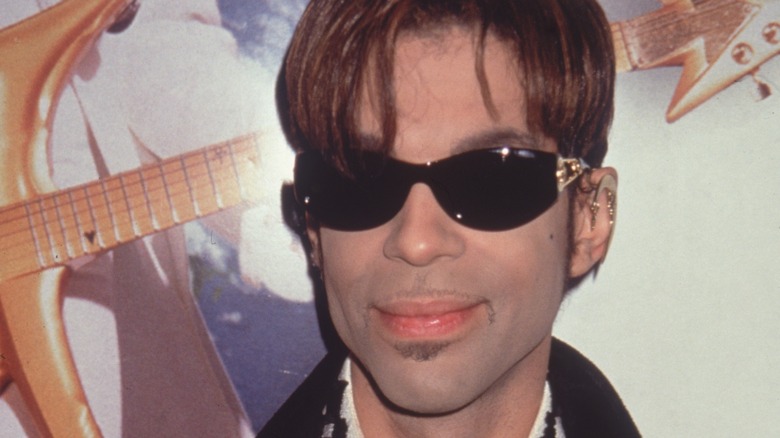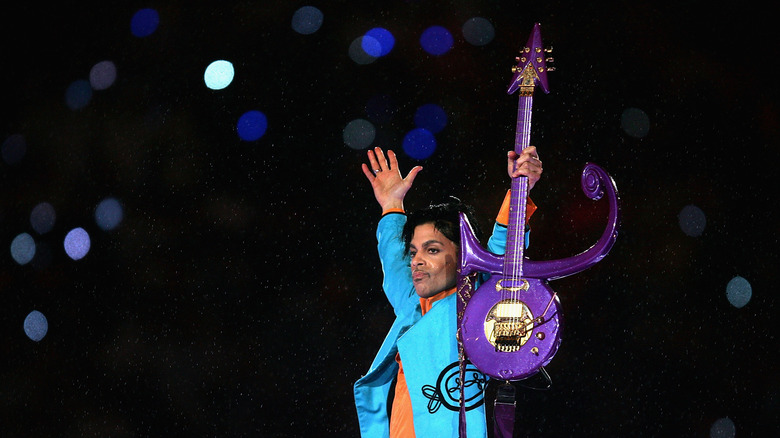Here's Who Inherited Prince's Massive Fortune After He Died
In a year that seemed to play host to the tragic deaths of an unusual number of major celebrities, the loss of pop genius Prince in 2016 came to many as a shock. Before he died, Prince seemed to be at a creative peak. He had formed a new backing band, 3rdeyegirl, and was continuing to record and perform well-received music. During the last year of his life, the Minnesota musician was also highly visible due to political activism and his involvement in the Black Lives Matter movement. But little did Prince's fans know he was also privately dealing with addiction to opioid painkillers that he had initially used to combat chronic hip pain.
Prince died of an overdose of the drug fentanyl, aged 57, and left behind an enormous personal fortune and a body of work worth millions of dollars. Prince had no will, and that put control of his fortune — and his music — on the line. That set the stage for what the Star Tribune later described as one of the most complicated and expensive probate cases ever in Prince's home state of Minnesota. That case is now settled and as court documents reveal, we finally know how the "Purple Rain" singer's money was divided.
With no will to reveal who would inherit his fortune, and with the late singer unmarried and childless at the time of his death — Prince's only son, Amiir, tragically died in infancy in 1996 — a major legal battle ensued, with numerous figures staking their claim for what the IRS initially estimated to be a $163.2 million fortune.
Heirs and Acquisitions
After Prince's death fans learned that his estate was to be carved up between his six siblings and half-siblings managed by the Comerica Bank & Trust. In 2021, three of Prince's inheritors sold their stakes to Primary Wave, a New York music publishing company that from then on controlled half of the estate.
Since his death, several albums of new material have been released from the star's extensive private archive at his Paisley Park complex, which Forbes reported to contain more than 8,000 songs, so those that retain the rights to Prince's music could enjoy healthy profit from unreleased material for years to come. Primary Wave, whom the Star Tribune describes as an "aggressive" and "well-funded" organization that controls the catalogs of a number of musicians such as Ray Charles and Stevie Nicks, made an offer to Prince's other siblings but they reportedly held on to their assets, claiming: "We'll never sell out. We know the prize."
As well as the acquisition of the rights to Prince's catalog, another ongoing legal wrangle concerned the valuation of Prince's estate in total, including property such as his 65,000-square-foot Paisley Park complex. The administrators of Prince's estate, the Comerica Bank & Trust, originally valued it at $82.3 million, though, at almost half of the IRS estimate. The IRS punished the estate for what they considered an intentionally low valuation with an "accuracy-related penalty" of $6.4 million so that the estate was losing value even before the dispute went to court. In response, Comerica sued the IRS and claimed the government agency made numerous miscalculations in its assessment.
The 2022 Prince settlement
The two entities thus found themselves locked in a debate over the true value of Prince's estate, including his property assets and music catalog. For example, according to The Star Tribune, Comerica first valued Prince's properties, which included his sprawling Minneapolis compound Paisley Park, at $15.7 million, while the IRS made an estimate of $21.4 million. After months of wrangling, they eventually settled on a valuation of $17.7 million for the property, and $156 million for the estate in total, $7.2 million lower than that originally made by the IRS.
The settlement prevented the disagreement from going to court, saving both sides potentially millions in legal fees, with the IRS also agreeing to drop their penalty against Comerica. The Midwestern-based bank called the settlement "fair and reasonable." The $156 million was to be split between Prince Legacy LLC, made up of three Prince half-siblings, and Prince OAT Holdings LLC, owned by Primary Wave, with a number of interests represented. Comerica Bank & Trust were awarded $3 million in the settlement to cover the cost of closing the estate.
A new dispute at Prince Legacy LLC
It seemed that the legal drama of the Prince estate was finally settled in August 2022, when a judge in Minnesota made the settlement between the IRS and Comerica legally binding. By then, the dispute had been dragging on for over six years. Sadly, the peace didn't last long.
In January 2024, L. Londel McMillan and Charles Spicer, two entertainment lawyers and managers of Prince Legacy LLC — the entity that was set up to manage the stakes of Prince's relatives after the closing of the musician's estate in 2022 – filed a lawsuit against four of the musician's family members. The suit claimed that inheritors and one other relative had attempted to alter the laws of the LLC and oust McMillan and Spicer, and that Sharon Nelson had attempted to sell off her share of the assets.
While working on behalf of the family in negotiations with Primary Wave, the lawyers, who were friends of Prince, had chosen to charge no fee to their clients, however, they received a portion of the relatives' shares instead. Their ousting would therefore be against the lawyers' interests, but they have argued instead that the move against them puts the estate itself at risk, and may be detrimental to Prince's legacy, the protection of which is at the heart of the company. Later that month, a judge in Delaware sided with McMillan and Spicer, ruling that they will keep their roles at Prince Legacy LLC for the foreseeable future.



